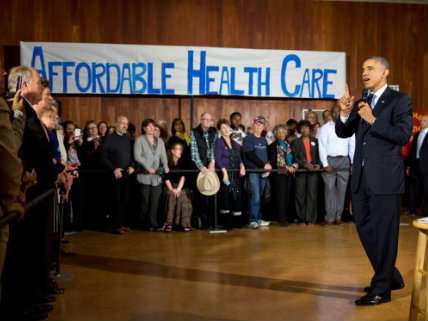Court Rules That Subsidies in Obamacare's Federal Exchange are Illegal, Dealing Huge Legal Blow to Health Law

The U.S. Court of Appeals for the D.C. Circuit delivered a huge blow to Obamacare this morning, ruling that the insurance subsidies granted through the federally run health exchange, which covered 36 states for the first open enrollment period, are not allowed by the law.
The highly anticipated opinion in the case of Jacqueline Halbig v. Sylvia Mathews Burwell reversed a lower court ruling finding that federally run exchanges did have the authority to disburse subsidies.
Today's ruling vacates the Internal Revenue Service (IRS) regulation allowing the federal exchanges to give subsidies. The large majority of individuals, about 86 percent, in the federal exchange system received subsidies, and in those cases the subsidies covered about 76 percent of the premium on average.
The essence of the court's ruling is that, according to the law, those subsidies are illegal. They were always illegal, and the administration never had the authority to offer them. (According to an administration official, however, the subsidies will continue to flow throughout the appeals process.)
The court's ruling agreed with challengers who argued that the plain language of the law, which in multiple instances limits subsidies and credits to any "Exchange established by the State," does not allow subsidies to be disbursed in exchanges where a state declined to establish its own exchange and is instead run by the federal government. Basically, the federal government cannot step in and create and run an exchange that is somehow still an exchange established by a state.
"We conclude that appellants have the better of the argument: a federal Exchange is not an 'Exchange established by the State,' and [the relevant section of the law] does not authorize the IRS to provide tax credits for insurance purchased on federal Exchanges," the decision says.
The law "plainly makes subsidies available only on Exchanges established by states," the ruling says. "And in the absence of any contrary indications, that text is conclusive evidence of Congress's intent. To hold otherwise would be to say that enacted legislation, on its own, does not command our respect—an utterly untenable proposition."
It's a major blow to the way the administration has chosen to implement the health law, and a victory for plain language legal interpretation as well.
Update: On a conference call this morning, Case Western University Law Professor Jonathan Adler, who was instrumental in laying the legal groundwork for the case, made the point that this is not the court changing the law. It is the court interpreting the law and its clear language. Which means that any of the ruling's effects, including the loss of subsidies, were built into the law when it was passed.
"If people lose those subsidies, it's because the courts rule that those subsidies are and always have been unlawful," he said. The administration "never had the authority" to dish them out. "Halbig did not cause those effects. Those are the effects of the Affordable Care Act."
"If that causes dislocation, if that causes disruption, I think the responsibility lies with the IRS and the administration," Adler also said.
Update 2: A different circuit court ruled today that subsidies offered through federally run exchanges are authorized on the law. This creates a circuit court split, which increases, but does not guarantee, the chances of an eventual hearing by the Supreme Court. It is also possible, and arguably even more likely, that the circuit split will be dealt with via en banc review.
Read the complete decision here. More background on the case here and here. I'll have more to say after sorting through the full details of the ruling. This post will be updated.


Show Comments (310)